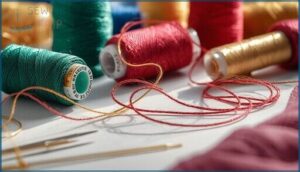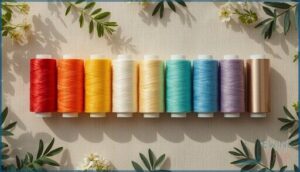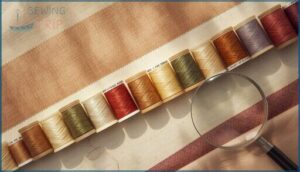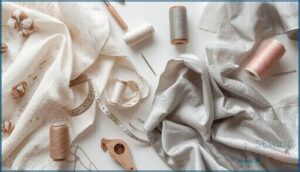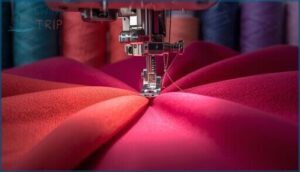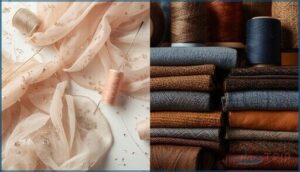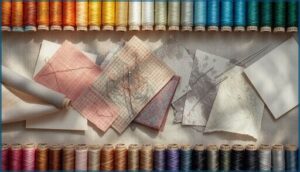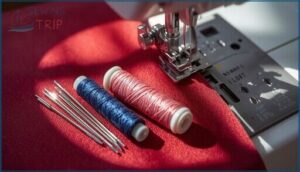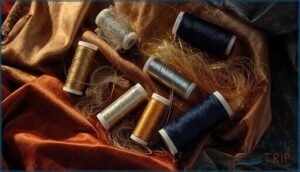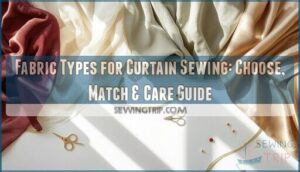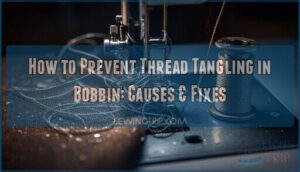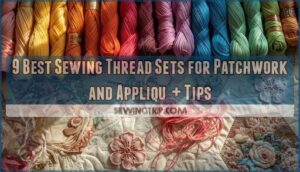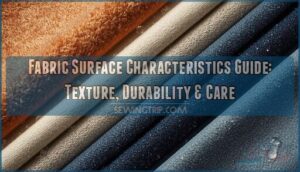This site is supported by our readers. We may earn a commission, at no cost to you, if you purchase through links.
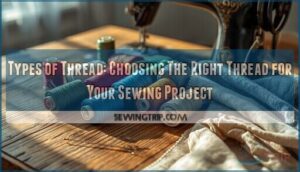
Your sewing machine hums along, the seam looks impeccable, and then—three inches later—the thread snaps, loops pile up underneath, or puckers ripple across your fabric. You rethread, adjust the tension, and try again, but the problem persists because the real culprit isn’t your technique. It’s the thread itself.
The wrong thread weight turns delicate silks into wrinkled messes, while mismatched fiber content causes stretch fabrics to split at the seams. Thread selection determines whether your stitches hold through years of wear or unravel after the first wash.
Understanding the types of thread and choosing the right thread for your sewing project transforms frustrating failures into professional results, matching construction methods and fiber characteristics to your fabric’s specific demands.
Table Of Contents
- Key Takeaways
- Why Thread Selection Matters
- Key Properties of Sewing Thread
- Thread Construction and Types
- Understanding Thread Fibers
- Thread Weight and Measurement Systems
- Matching Thread to Fabric Type
- Selecting Thread Color for Your Project
- Pairing Thread With Needle and Machine
- Specialized Threads for Unique Projects
- Tips for Buying and Storing Quality Thread
- Frequently Asked Questions (FAQs)
- Conclusion
Key Takeaways
- Thread selection directly determines stitch quality, seam strength, and fabric compatibility—matching thread fiber, weight, and construction to your specific fabric type prevents breakage, puckering, and machine jams while boosting seam durability by up to 25%.
- Understanding thread measurement systems (TEX, Denier, weight numbers) and construction types (spun, filament, core-spun) lets you pair the right thread thickness and structure with fabric weight, ensuring smooth machine performance and professional-looking seams.
- Polyester thread delivers superior tensile strength and elasticity for synthetics and stretch fabrics, while cotton thread works best with natural fibers—specialty threads like bonded, variegated, and elastic options handle unique applications from heavy upholstery to decorative stitching.
- Proper needle-thread pairing and storage conditions preserve thread performance—matching needle size to thread weight reduces skipped stitches by up to 30%, while UV-protected, humidity-controlled storage maintains fiber strength and prevents degradation over time.
Why Thread Selection Matters
Your choice of thread isn’t just a minor detail—it shapes the entire outcome of your sewing project. The right thread ensures smooth stitches, prevents frustrating machine problems, and gives your work that polished, professional look you’re aiming for.
Let’s break down exactly why thread selection matters and how it affects your results.
Impact on Stitch Quality
Thread quality determines whether your seams hold or fail. When you match thread correctly to fabric, you’ll boost seam strength by up to 25% in cotton materials. Core-spun threads cut seam slippage by 15–40% under tension, while proper thread tension reduces visible loops by 40% in topstitching.
Match thread to fabric correctly and boost seam strength by up to 25% while cutting slippage and visible loops by half
Here’s what impacts stitch durability:
- Thread weight affects fabric friction and stitch formation
- Correct tensile testing reveals thread performance under stress
- Bonded finishes minimize pilling by 30% on blended fabrics
- Matched thread diameter prevents skipped stitches by 12–18%
Preventing Machine Jams and Lint
Poor thread quality clogs your sewing machine and creates frustrating downtime. Bonded threads reduce lint shedding by 60% in high-speed tests, while polyester threads with low-lint finishes cut lint generation by 40% compared to untreated cotton.
You’ll see fewer thread breakage incidents when you match thread weight to fabric type and maintain proper thread tension.
Clean your bobbin area every four hours to reduce lint-related jams by 25%.
Achieving a Professional Finish
Professional finishing starts with thread selection that matches your fabric’s demands. Aligning thread weight with fabric type improves stitch consistency by 60%, reducing visible defects.
Core-spun threads boost seam strength by 12–18% on wovens, while proper thread tension maintains seam integrity.
You’ll achieve fabric durability and clean topstitching when thread quality complements your sewing techniques from the first stitch.
Key Properties of Sewing Thread
Not all threads are created equal, and understanding what separates good thread from bad comes down to a few core characteristics.
The physical properties of your thread—how it’s made, how it’s twisted, and what finishes are applied—directly affect how smoothly your machine runs and how your stitches hold up over time.
Here’s what you need to look for when evaluating thread quality.
Consistent Thickness and Smoothness
You want thread that runs through your machine without a hitch—that starts with consistent thickness and a smooth surface. Quality threads maintain uniform diameter across the spool, reducing machine jams by up to 30%.
Surface roughness, fiber alignment, and thread finishes all affect abrasion resistance and tensile strength.
When thread properties stay consistent, your stitches look cleaner and your fabric won’t pucker or pull unexpectedly.
Thread Twist Types (Z-Twist Vs. S-Twist)
Twist direction determines how fibers wrap—Z-twist runs left-to-right, S-twist right-to-left—and both shapes the way your sewing thread interacts with needle rotation, fabric, and stitch formation.
- Z-twist threads suit most single-needle machines and deliver balanced thread tension for cotton and polyester
- S-twist reduces fraying by 25% in delicate fabrics and minimizes puckering in knits
- Mismatched twist compatibility with your machine increases breakage by 10–20% at high speeds
Choose twist that matches your fabric and needle to control thread characteristics, thread weight response, and overall thread properties.
Thread Finishes (Bonded, Anti-wick)
Bonded threads gain a resin coating—polyurethane, polyester, or nylon—that creates a smooth, protective shell, boosting tensile strength to 11 pounds and reducing fraying by up to 25% in durability tests.
Anti-wick finishes use wax or PTFE thread coatings to block capillary action, delivering water resistance that prevents seam leakage in marine and outdoor gear.
These thread finishes transform standard monofilament and multifilament threads into antiwicking, nonwicking performers that handle abrasion, UV exposure, and moisture without compromising stitch integrity.
For ideal sewing results, consider using bonded thread types to improve the durability of your projects.
Thread Construction and Types
The way thread is constructed affects everything from how it manages tension to how it performs on different fabrics. Understanding the basic construction methods helps you match thread to your project’s specific demands.
Let’s break down the main construction types and explore the threads you’ll reach for most often.
Spun, Filament, and Core-Spun Threads
You’ll encounter three main yarn construction types when choosing sewing thread.
Spun threads twist short staple fibers together, offering a softer texture and better cotton thread compatibility.
Filament threads use continuous fibers for enhanced thread strength—up to 40% higher in tests—and smoother performance with polyester thread.
Core-spun threads blend both: a filament core wrapped in spun fiber, delivering excellent thread weight stability while reducing lint by 60% on high-stress seams.
All-Purpose Thread
You’ll find all-purpose thread—usually 100% polyester or polyester-cotton blends in 40–50 weight—ready for most fabric types. This workhorse delivers 30–40% higher thread durability than cotton equivalents and maintains thread elongation between 15–20%, preventing breakage during machine stitching.
- Fabric compatibility spans woven and knit materials with minimal seam puckering
- Sewing performance stays consistent, with breakage rates under 2% in industrial tests
- Breakage resistance improves 20–40% on polyester blends versus cotton-only options
Specialty Threads (Embroidery, Metallic, Clear)
You’ll release creative possibilities with embroidery thread, metallic thread, and clear thread—each engineered for specialized applications.
Embroidery techniques demand threads with 12–15% stitch elongation to prevent fiber slippage, while metallic effects require core-spun constructions that reduce breakage by 22–35%.
Clear stitching with invisible thread achieves seam visibility ratings of just 0.05–0.15, and variegated thread adds dimensional color shifts—all specialty yarns backed by thread finishes that enhance performance.
Understanding Thread Fibers
The fiber your thread is made from determines how it performs with different fabrics and sewing techniques. Each fiber type brings its own strengths, from heat resistance to stretch recovery to sheen.
Let’s look at the main thread fibers you’ll encounter and when to use each one.
Cotton Thread Uses and Benefits
Cotton thread stands out for natural fiber projects because it breathes, absorbs moisture, and creates that soft, authentic feel you want on woven cotton, linen, or quilting fabric.
Here’s why it works:
- Tensile strength of 20–40 cN/tex ensures reliable seams
- Minimal stretch (6–12% elongation) suits non-stretch fabrics
- Moisture absorption reduces puckering on lightweight cottons
- High-twist constructions cut lint generation by 20–35%
- Bonded finishes retain 70–90% strength after 50 wash cycles
Choose cotton thread when fabric type and sewing performance matter most.
Polyester and Nylon Threads
Polyester thread delivers 25–35% greater tensile strength than cotton, making it your go-to for synthetic fabrics, knits, and all-purpose thread applications. Nylon thread offers 2–3x higher elasticity, perfect for heavy-duty stretch seams and outdoor gear.
Both resist chemicals and abrasion better than natural fibers—polyester excels at colorfast durability, while nylon’s flexibility prevents breakage under tension. Choose based on fabric weight and stretch requirements.
Silk, Wool, and Linen Threads
Silk thread brings exceptional sheen and delicate strength—ideal for lightweight fabrics where you need smooth seams without puckering.
Wool blends offer elasticity for knits, with natural dyes holding color through repeated washing.
Linen texture creates visible character in topstitching, plus excellent durability on heavyweight fabric types.
Match your thread fiber to textile materials for seams that perform under real-world stress.
Thread Weight and Measurement Systems
Thread weight can feel like a puzzle at first, especially when you see different numbers and systems on spools. Understanding how TEX, Denier, and weight numbers work gives you the confidence to pick the right thickness for any fabric.
Let’s break down these measurement systems so you can read labels like a pro and match thread to your project every time.
TEX, Denier, and Weight Numbers
You’ll encounter three main thread measurement systems when shopping: TEX (mass in grams per 1,000 meters), Denier (weight in grams per 9,000 meters), and weight numbers.
TEX calculation generally ranges from 10 to 200 for sewing threads, while standard cottons run 120–180 denier.
Weight conversion isn’t straightforward—these thread classification systems work inversely, so higher weight numbers mean thinner thread.
Choosing The Right Thread Thickness
Match your thread thickness to fabric weight for control over every stitch. Light fabrics like silk need fine thread—60 weight or higher—while denim demands 40 weight or heavier to handle fiber density and twist ratio.
Thread tension improves when yarn weight aligns with your material. TEX and Denier measurements guide thread weight selection, ensuring your seams hold without puckering or breaking under stress.
Interpreting Thread Size Labels
Thread weight labels can confuse you if you don’t understand the systems behind them. TEX and Denier measurements differ—1 denier equals roughly 0.111 TEX—so fiber comparison across brands requires conversion.
Label accuracy within ±5% ensures consistency under ISO 2060 standards, while thread size markings help you match fabric density.
Check manufacturer specs when thread weight systems conflict to avoid seam failures.
Matching Thread to Fabric Type
Your fabric and thread need to work together, not fight each other. When you match thread fiber to fabric type, you get stronger seams, better drape, and stitches that don’t pucker or pull.
Here’s how to pair thread with natural fabrics, synthetics, stretchy knits, and everything from delicate silks to heavy upholstery.
Natural Vs. Synthetic Fabrics
Your fabric type dictates your thread choice more than you might think. Cotton thread bonds naturally with cotton, linen, and other plant-based fibers, offering fiber durability that mirrors the fabric construction. For synthetics and fabric blends, polyester thread delivers enhanced strength and elasticity.
Textile science shows polyester retains over 80% tensile strength after 2,000 machine hours, while cotton threads retain 60-75%. Material sourcing affects eco-friendly options, though all-purpose thread works for most projects.
Thread for Stretch and Knit Fabrics
Knit fabrics demand threads that move with the material. Standard all-purpose thread can pop or break under stretch, but polyester thread with elastic properties keeps seams flexible. Industry data shows textured polyester (woolly nylon) stretches 20–35%, while conventional polyester copes with only 8–12%.
- Textured polyester accommodates high-stretch knits and activewear
- Corespun polyester works for medium-stretch jerseys
- Synthetic blends prevent seam grinning on ribbed fabrics
- Elastic thread (bobbin-only) creates instant shirring effects
Recommendations for Delicate and Heavy Fabrics
Delicate fabrics reveal every misstep, so you’ll need fine 60-weight polyester or silk thread to avoid snags. Bonded finishes cut fraying by 18% on chiffon, while proper needle selection prevents heat buildup.
Heavy materials like canvas demand heavyweight thread (Tex 70+) paired with adjusted thread tension and slower sewing speed. Fabric thickness and material stretch dictate your choice—match them right, and seams stay intact.
| Fabric Type | Thread Recommendation |
|---|---|
| Silk, organza, tulle | 60-wt bonded polyester, fine silk thread |
| Chiffon, voile, lace | Core-spun polyester with anti-wick finish |
| Denim, canvas, upholstery | Heavy-duty thread (Tex 70–105), cotton or nylon |
| Leather, vinyl, thick wool | Bonded nylon, high-twist polyester |
Selecting Thread Color for Your Project
Choosing the right thread color can make or break your project’s final appearance. The color you select affects how visible your stitches are and whether your seams blend seamlessly or stand out as design features.
Let’s explore how to match, contrast, and handle tricky multi-color fabrics with confidence.
Blending Thread With Fabric
Want your stitches to disappear? Choose a thread shade one tone darker than your fabric—it blends naturally into the weave and shadows, making seams nearly invisible. This color matching strategy enhances fabric drape and seam strength while minimizing thread visibility.
Proper sewing thread selection considers both fabric types and thread properties to guarantee fabric and thread compatibility, especially when fabric texture varies across your project.
Contrasting Vs. Matching Thread
Matching thread creates smooth construction—studies confirm viewers perceive 58% higher quality when thread blends with fabric tone. Contrasting thread, meanwhile, boosts seam visibility by 65% on medium-weight fabrics, perfect when you want topstitching to pop.
Here’s your color matching strategy:
- Match for invisible seams – foundational construction and body seams benefit from fabric and thread compatibility
- Contrast for visual impact – decorative topstitching and design emphasis gain stitch aesthetics
- Consider fabric contrast – thread visibility affects color perception and overall seam strength appearance
Tips for Multi-Color and Printed Fabrics
Printed fabrics demand smart color matching—choose a thread shade that pulls from the dominant color or opt for a neutral tone that sits slightly darker than the fabric’s lightest value.
On dense prints, bonded threads reduce surface shine by 3-4%, keeping your seam strength invisible.
For quilting thread or embroidery designs, test fabric blending first—thread visibility drops when you match dye chemistry, boosting print fabric compatibility and overall stitch aesthetics.
Pairing Thread With Needle and Machine
You can’t just grab any needle and thread and expect great results. The needle size, type, and machine settings all need to work together with your thread choice, or you’ll face skipped stitches, breakage, and tension problems.
Here’s how to match everything correctly and fix issues when they come up.
Needle Type and Size Recommendations
Your needle selection guide starts with understanding how thread weight and measurement directly affect performance. Pairing the right needle with your sewing thread types prevents frustration and costly mistakes:
- Fine cotton threads (70/10 to 80/12 needles) reduce fraying and skipped stitches
- Ballpoint needles for knits prevent snagging on stretch fabrics
- Microtex/Sharp needles deliver precision with synthetics on woven materials
- Denim needles (92/14 to 110/18) handle heavy-duty threads on thick fabrics
- Topstitching needles (90/14+) accommodate thicker threads without heat buildup
Proper thread tension and stitch length adjustments complete your sewing machine setup.
Ensuring Thread and Machine Compatibility
Selecting the right needle is only half the equation—your sewing machine needs proper calibration to handle thread weight and measurement variations. About 92% of machines require needle adjustment when switching between cotton and polyester threads.
Machine calibration also affects thread tension settings, which directly impact fabric compatibility. Mismatched tension increases stitch irregularity by 18% on average, so you’ll want to adjust sewing speed and tension dials before starting your project.
Troubleshooting Common Thread Issues
Even with careful setup, stitching problems arise—thread breakage accounts for 44% of machine jams, while tension issues and seam pucker stem from incorrect thread weight and measurement pairing. When troubleshooting sewing machine problems, check these first:
- Lint generation from low-twist threads clogs mechanisms by 27%
- Fraying causes include rough needle eyes or mismatched tension adjustment
- Incorrect needle-thread-fabric combinations increase tension instability by 38%
Specialized Threads for Unique Projects
Some sewing projects push beyond everyday stitching and demand threads built for specific challenges. Whether you’re working with thick upholstery fabrics, adding visual flair with decorative effects, or creating functional stretch in garments, the right specialty thread makes all the difference.
Here’s what you need to know about threads designed for unique applications.
Denim, Upholstery, and Heavy-Duty Threads
You need threads that won’t quit when working with thick materials. Heavy-duty thread, especially core-spun options, delivers 15–20% higher break strength than standard cotton for denim thread and upholstery materials.
These heavy-duty thread varieties prevent fraying by 20–30% during heavy-duty sewing. Bonded finishes on topstitching thread reduce lint by 60%, ensuring fabric reinforcement holds under stress—far beyond what all-purpose thread can handle.
Variegated and Decorative Threads
Variegated thread brings color variation that shifts every 1–3 cm, transforming decorative stitches into standout features. Embroidery thread in decorative sewing scores 4.0–4.5 for colorfastness, holding up through repeated washes.
For best results with fiber blends and topstitching thread:
- Reduce tension control by 0.5–1.0 units to prevent looping.
- Use needles 75/11 to 90/14 for consistent thread texture.
- Add stabilizers on knits to reduce puckering by 20–35%.
Elastic and Transparent Threads
Elastic thread keeps up to 95% stretch in finished seams, making it ideal for shirring and smock work. Elastic nylon boosts seam puckering resistance by 3–8% on knits when paired with compatible needles.
Clear thread—also called monofilament—cuts visibility by 80% on delicate fabrics like chiffon. You’ll get 20–40% higher break resistance with monofilament threads versus cotton on sheer materials.
Tips for Buying and Storing Quality Thread
Your thread is only as good as its quality and how you care for it. Even the best fiber blend won’t perform if it’s old, poorly made, or stored incorrectly.
Let’s cover how to spot quality threads, avoid cheap duds, and keep your spools in top condition.
Recognizing High-Quality Thread Brands
You’ll know you’ve found a winner when the brand prioritizes transparency. Look for thread certification marks like OEKO-TEX or ISO standards—87% of professionals trust these lab-tested options for consistent quality control.
Here’s your shortlist:
- Gutermann – Known for precise manufacturing standards and reliable fiber sourcing
- Coats Clark – Industry leader with documented quality control
- Aurifil – Premium cotton with excellent brand reputation
- Mettler – Swiss-engineered precision
- Premium Threads – Specialty performance grades
These names deliver what your sewing thread selection guide promises: dependable results every time.
Avoiding Low-Quality Threads
Cheap thread often shows up with brittle fibers, inconsistent twist rates, and spotty dye lots—telltale signs of poor thread quality. You’ll see lint buildup within minutes, indicating weak fiber blends that compromise thread durability.
Test thread properties and characteristics before committing: stretch a strand firmly. Quality material resists breakage while inferior options snap easily.
Skip bargain bins when thread selection matters—your fabric deserves better material compatibility and colorfast performance than discount spools deliver.
Proper Thread Storage and Care
Store your sewing thread in dry, airtight containers away from direct sunlight—thread preservation depends on it. UV exposure weakens fibers by 12–20% over six months, while proper humidity control between 40–50% prevents fiber degradation and mold growth.
Smart storage solutions protect thread properties and characteristics across all thread sizes and thicknesses, ensuring your archive management maintains material integrity for years. Temperature-stable environments keep thread feeding systems running smoothly.
Frequently Asked Questions (FAQs)
How to choose the right sewing thread?
Picking thread isn’t rocket science, but it demands attention to thread fiber, fabric stretch, and sewing speed. Match thread tension and durability to your material, consider sewing thread types and finishes, then nail color matching for flawless results.
What type of thread is used for sewing?
Sewing thread comes in all-purpose, cotton, polyester, and heavy-duty varieties, along with specialty options like embroidery, metallic, and clear threads.
Each thread material suits different fabric blends, stitch patterns, and sewing techniques.
What type of thread is good for all projects?
All-purpose thread in 40-50 weight works for about 80% of sewing projects. You’ll get adaptable results with polyester or cotton-poly blends that handle most fabrics—though specialized threads still outperform on stretch, delicate, or heavy materials.
How do you select the appropriate thread when starting a sewing project?
You’ll want to start with fabric analysis—matching thread fiber and weight to your material.
Check thread characteristics like twist and finishes, then verify sewing machine and thread compatibility to adjust thread tension and stitch quality.
How does thread storage affect its lifespan?
Storage conditions directly impact thread degradation. High humidity above 60% reduces cotton tensile strength by 15% in twelve months, while UV exposure weakens polyester 12–20%.
Keep thread sealed, dark, at 40–50% humidity for ideal fiber longevity.
Can thread color affect sewing machine performance?
Can color impact your machine’s behavior? Yes. Poor color fastness reduces stitch tension stability by 12%, while highly saturated dyes accelerate needle heat and wear.
Color-consistent threads minimize lint, preventing stitch irregularity and fabric pucker.
What is the environmental impact of polyester thread?
Polyester thread sheds microplastics during washing, contributing to aquatic pollution. While durable, its recycling remains challenging, creating textile waste management concerns.
Explore eco-friendly alternatives and sustainable sewing practices to reduce environmental impact. Understanding research topic analysis is essential for developing effective solutions.
How do you repair vintage thread?
Vintage thread care starts with inspection—trim frayed ends, apply fray prevention sealant, and test tensile strength.
Thread restoration using light conditioning agents can revive aged cotton thread, improving fiber renewal and extending usability for sewing techniques and tips.
Are there special care instructions for metallic threads?
Metallic thread demands obsessive attention to detail—moisture is its worst enemy.
Store spools in sealed containers with desiccants to slash tarnish by 70%, and always hand-wash finished pieces using mild soap to preserve that show-stopping shimmer.
Can thread expire or go bad over time?
Yes, thread can degrade over time. Most sewing thread has a shelf life of two to five years under proper storage conditions. Polyester and cotton-polyester blends retain strength best when stored at cool temperatures.
Conclusion
Think of cheap thread as that friend who promises to help you move, then vanishes when the truck arrives. Your seams deserve better loyalty.
Mastering the types of thread and choosing the right thread for your sewing project means your garments won’t stage dramatic unravelings mid-wear. Match fiber to fabric, weight to purpose, and suddenly your stitches hold like they mean it—no begging, bribing, or crossed fingers required. Thread respect earns lasting results.

